

Posted on 12/24/24
| News Source: Times of Israel
My father taught us that you never tell someone you're going to tell them a joke. It raises people's expectations and takes away the whole surprise.
So let me open with a I heard long ago.
A woman went to her doctor early in her pregnancy. He informed her that she was carrying twins. In addition to the usual advice, he recommended that she take a pill which would guarantee that her children would be well-mannered.
“Of course,” she replied excitedly. “Who wouldn’t want gracious children?”
The doctor gave her a prescription for Polite Pills and instructed her to take one pill a day — and no more than that — for the duration of her pregnancy. She figured that if one tablet was good, two would be even better (and maybe three, once in a while), so despite her doctor’s admonition, she increased her dose.
In due time (pun intended), her expected birth date came…and went. Nine months went by, then ten and eleven. The years passed, and her swollen belly just kept getting bigger and bigger. Many decades later, the gray-haired lady with the inordinately-distended abdomen passed away.
The doctors couldn’t wait to find out what had occurred, so they brought her body to the autopsy room and opened her up.
Much to their surprise, there were two middle-aged men with salt-and-pepper beards, bowing to one another and debating back and forth:
“You first!”
“Oh no, I couldn’t possibly. YOU go first!”
“No, no, no. I insist. After you!”
***
We recently celebrated my mother’s third yahrzeit. Perhaps ‘commemorate’ would be a more natural word than ‘celebrate’, but it truly was a celebration of her life and lessons. It’s a rare treat to have all of my siblings and their spouses together, but everyone made sure to be in Israel at the same time for the observance her yahrzeit. There were numerous memorable moments along the way.
One of them took place at the cemetery. As we gathered during the afternoon of the yahrzeit and congregated around her monument, we noticed that someone had taken the stones which had been left there by visitors, and arranged them into a heart.
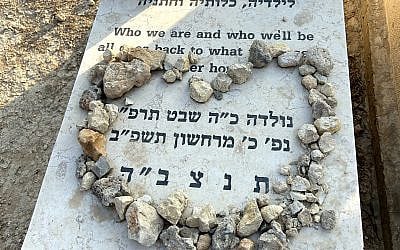
It was truly touching, since my mother had put her heart not only into us, but into everything she touched.
One of my siblings (actually a sister-in-law, but my mother never distinguished between her children and their spouses — they were her children — so I can call her a sibling) revealed the identity of the culprit. Her eldest, who had loved her Savta dearly, had created the touching the rock formation.
The actual date of the yahrzeit was a Thursday, which is both a school day and work day, precluding any major family get-togethers. So we waited until the next day, Friday, for a broader family gathering. Let’s skip to Friday at this point, and come back to write about the Thursday evening Shul fight a bit later.
***
We immortalized the day by organizing a park clean-up on Friday. Allow me to explain the significance of this activity.
My mother always left a room in better condition than she entered it. She was incapable of passing a piece of garbage without picking it up and disposing of it. Even through her defective corneas, she somehow could spot an errant thread on the carpet. To our profound dismay in her later years, she would plant one hand on her walker, balance herself precariously, and reach down to pick up the offending fiber.
I remember back to my childhood. There was a busy street called North Shore Drive in the small city of Binghamton, where I grew up. When the heavy snows of winter collided with the dirty underbellies of the vehicles traversing the road, quite a bit of black sludge built up, and aggregated as muddy refuse along the island which separated the two sides of the street.
This did not make my mother happy.
So she would regularly call the mayor’s office to implore them to send a cleaning crew to rid the road of the offending filth. They would thank her for her concern, hang up the phone, and promptly do absolutely nothing.
My mother grew up in Brooklyn. She liked to tell people that she studied at Erasmus Hall High School, where Barbara Streisand would later attend. So, while her sweet side was her predominant one, she also knew how to stand tall and take care of business, when necessary. So one fine day, a police vehicle stopped in the middle of North Shore Drive, where they found some lady with a broom and dustpan, cleaning the dirt from the road in the middle of all the traffic.
Incredulous, they confronted her: “Lady, what are you doing?”
“Well, no one from the city seems to want to do it. So doing it.”
It should now be abundantly clear why we chose, for her yahrzeit, to clean up a park. This activity was unique and memorable, watching our ever-growing Israel-based family contingent blanketing the mountainside with an industrious, multi-generational sanitation crew.
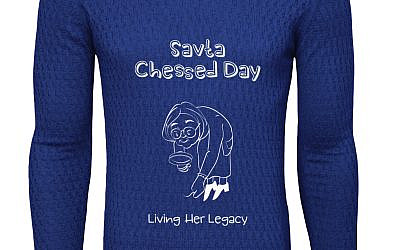
She would have loved it! She would have been , seeing three dozen of her children, grandchildren, and great-grandchildren beautifying a piece of the Holy Land. A rarefied taste of North Shore Drive, on the scenic outskirts of Jerusalem.
My mother also would have at the prizes we found to give out to the kids, as a perk for gathering the garbage. She would have loved that we ordered the games from a family, whose husband has spent so many days in the IDF, that their business is now in bad straits. In fact, I encourage everyone to help support their business by sending Chanukah presents to friends and families in Israel, via their link: otzarot-toys.co.il. Or, also through them, you can sponsor games to be delivered to soldiers’ families, recovering warriors, and displaced families, at: www.peach-in.com/cmp/MGsVu1pat?ref=YHhx2cen
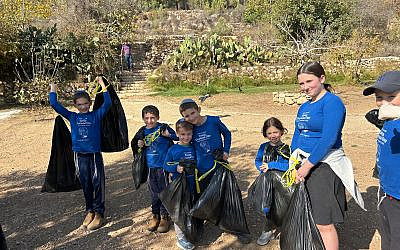
At this point, we must reluctantly return to the day before, and attend to the fight in Shul. After all, when the headline promises, we have to deliver!
Following our return from the cemetery visit, my siblings and I headed to the Shul across the street for Mincha. My older brother, Kal, removed himself from the possibility of leading the davening by attending an earlier minyan. My younger brother Maish and I had both led our respective Shuls that morning, and, after going back and forth a bit, I finally approached the front of the Shul.
Only to find that someone was already standing there.
A young man, not from our shul, was there, clearly intending to lead.
On my mother’s yahrzeit.
Deep breaths, in and out, in and out.
(OK, I’m exaggerating the drama here, but I have to make the story worth your wait!)
“Are you an (mourner)?” I gently inquired.
“Yes, I’m in (the first 30 days of mourning).
That’s when the fight broke out. But there are fights, and there are .
Some fights are ugly.
And some fights are downright beautiful. Like this one.
‘What takes precedence, a yahrzeit or shloshim?’, we all pondered. One brother-in-law said that a yahrzeit comes first. Another brother-in-law thought the shloshim gets the nod.
“I can just go next door and lead the minyan there,” offered the young man.
“Don’t be silly,” we replied. “You’re here already.”
As the clock continued to tick away, the debate raged, in the spirit of the two polite gentlemen in the autopsy room:
“You first!”
“Oh no, I couldn’t possibly. YOU go first!”
“No, no, no. I insist. After you!”
Although I’m not one who usually hears voices from Above, my mother’s voice reached me, as clear as day reproving me, and I relayed what she said to the crowd:
“You’re arguing over who gets to daven for my yahrzeit? Don’t be ridiculous! Step aside and let this fine gentleman daven for his father!”
In more or less the same fashion, my siblings heard her voice as well, and backed me up. Regardless of the established protocol, she would never have wanted us to squabble over her honor, or preempt the feelings of another mourner for the sake of our own.
So as the dust quickly settled from our unconventional kerfuffle, and as we each licked our sweet battle wounds, the young man stepped up and began the Ashrei prayer.
***
Now you know the story. Consider it a lesson about fighting in Shul. The kind of fighting which might come from taking Polite Pills. The exalted sort of fighting which happens when you put others first.
That type of fighting that my mother — or any mother — would love.
***
That’s the end of the story, and the end of the blog. It really is.
So you can stop reading now.
But that doesn’t mean I’m going to stop writing.
Because right after our minyan, another very sweet moment occurred. It’s not part of the fight story (though it involves the same characters), or at least not an integral part. It’s more of a postscript. Or a supplement. Or an afterword.
But if you’re still here reading, I will give you a bit more background. So here goes.
***
In US-English, we use the expression “it dawned on me”. I never really thought about this phrase before, but I presume it means that, like dawn, the sun is rising, and shedding light on something which had been dark in the past.
In Hebrew, the equivalent expression is נפל האסימון , literally “the token fell”. It hearkens back to the days when payphones were fueled by round tokens, which could only be purchased at the post office. As the caller’s time on the phone went by, the ersatz coins would drop one by one. When the last one fell, the conversation was cut off. If you were making an international call, you would have to be ready with a pocketful of asimonim, and continually feed the metal box to make sure that the discussion could continue.
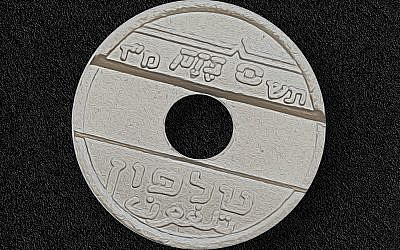
How this expression, “the token fell,” means that you came to a realization, I’m not exactly sure, but it’s a colorful metaphor. It probably derives from its UK-English counterpart: “The penny dropped.”
In any case, as it relates to our story, as soon as the young man began the Mincha service, the asimon fell. The penny dropped. It dawned on me.
I realized who he was.
His grandmother is a member of our shul, and I was at the funeral of his father a mere two weeks prior. In fact, at that burial I bumped into my nephew Naftali, who is a Rosh Kollel (head of a rabbinical academy) in Jerusalem, and son-in-law of my sister Cathy and brother-in-law Steve, who were right there with us at Mincha. When I asked Naftali why had come to the funeral, he explained to me that one of the sons of the deceased was a member of his Kollel.
It was the same fellow who was now standing before us, leading Mincha.
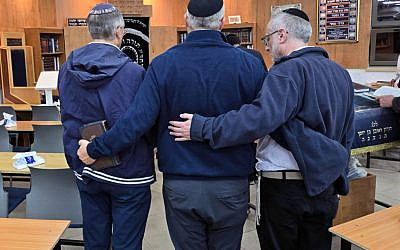
The ‘combatant’ on the other side of our faux feud had, in reality, a strong connection to a member of our family. Following the tefillah, I brought him over and introduced him around. He was pleasantly shocked to meet the in-laws and aunts and uncles of his Rosh Kollel, and was gushing with praise about the warm and nurturing tenor that our Naftali brings to their group of scholars.
Now it was our turn to shep nachas.
***
I like to call these moments of providential confluence “kisses from Hashem”. Those times when you do the right thing, and suddenly you are faced with unexpected beauty. To be showered with these kisses on my mother’s yahrzeit, because we heeded her call from Above, made these kisses all the sweeter.
***
Thanks for sticking with me. Now I’m done.
For real.